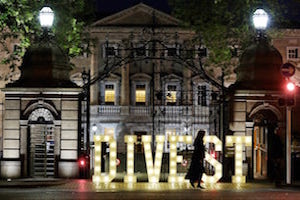
RICHARD BROOKS: The campaign in Ireland to push the Irish government to divest from fossil fuels has been running for several years and it culminated in the fall of 2016 when one of the independent deputies who sits in the lower house of the the parliament in Ireland introduced the Fossil Fuel Divestment Act. And this bill took about almost two years to work its way through various committees and votes with pressure building on the outside to eventually we got this vote that happened last week where the lower house of the Irish parliament passed the Fossil Fuel Divestment Act, making Ireland the first country in the world to commit its public funds to divest from fossil fuels entirely.
This was very much a grassroots-led campaign. We had thousands of people who signed petitions asking their elected officials in Ireland to move forward and support this legislation that included faith groups and student groups. Troicare, which is an Irish Catholic aid group, which was set up by the bishops of Ireland many years ago was actually one of the groups that very much led this campaign. They do a lot of development work in countries that are heavily affected by climate change, particularly in east Africa. Dozens of committee representations, lots of protests, very creative actions were happening and eventually it gathered support from all parties in Ireland, and resulted last week in this passing of the bill across party lines, which was great to see.
BETWEEN THE LINES: Richard, there are hundreds of divestment projects all across the world and I wonder if you would run down some of the most significant campaigns now being waged to divest public funds from the fossil fuel industry, including nations, cities, states, corporations, religious institutions and universities who all have experienced some movement in this direction.
RICHARD BROOKS: So, some really great examples of where there’s been success across these different institutional sectors includes the Rockefeller Family Fund. The Rockefeller Family Fund was one of the early charitable foundations that decided to divest. And the Rockefellers, one of the wealthiest families in the world, their wealth was built upon investments in the oil industry. They were the founders of Standard Oil, which later became Exxon Mobil.
For a family like that, for a foundation like that to move away from the fossil fuel industry, I think really speaks volumes to the importance of taking real action on climate change. New York City is another great example where there was a very long-standing, five-year campaign to push elected officials in New York City to divest the city pension funds. The city pension funds in New York City total almost $200 billion – one of the largest pension funds in the United States.
And in January, the mayor, with the comptroller stood up at a press conference and said, “We are taking real action. We’re getting out of fossil fuel companies and we’re going to take one more step. We’re going to sue the largest fossil fuel companies for the damages that they are causing to our city and the costs that we’re going to have to expand to mitigate against the impacts of climate change.”
Pretty significant. And I think the divestment movement created the space for these climate lawsuits to begin to be launched right across the country. Caritas, which is the one of the largest Catholic development agencies in the world, just recently announced that they were going to be divesting from fossil fuels. And, I think we’re seeing the beginnings of the steps towards the actual Vatican divesting from fossil fuels, which would be monumental and very important to a very large portion of the world’s population. The World Council of Churches was another organization that was an early adopter of fossil fuel divestment and made commitments to divest the churches in that council. So I think we’re seeing right across the board very significant developments and announcements, and the commitment. It’s very inspiring and I hope it’s inspiring to others to join in. There’s clearly momentum as we are building more and more institutions making these divestment commitments.




